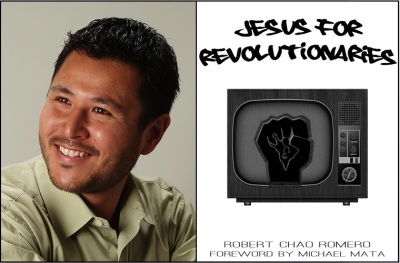Is Christianity a 'Racist, Classist, and Sexist Religion?' UCLA Professor Addresses 'Commonly Held Belief' Among Students

As a professor of Chicana/o Literature at the University of California, Los Angeles, Robert Chao Romero has seen his share of students fall in love with social justice—and fall out of touch with their Christian faith.
"As a professor at UCLA for the past eight or nine years, I've met activists, especially student activists, who fall away from faith or who refused to explore faith because they believe that Christianity is a racist and classist and sexist religion," Romero told The Christian Post.
"That's the commonly held belief in [the university and activist] spaces and as a Christian myself it has broken my heart for many years to experience that," he added.
Romero wants to change that narrative. Jesus Revolutionaries, which was released earlier this fall and is available for free online, seeks to present the Gospel and Jesus Christ as forces that catalyze — rather than inhibit, social change and present a "Biblical, historical, political, introduction to Christianity and social justice."
As a child of Chinese and Mexican immigrants, Romero said he finds the predominantly inner-city raised African-American and Latino students with whom he works have difficulty finding spaces on campus that both understand their faith and their backgrounds.
"Many activists…have few spaces to go to express their concern for social justice, to express their concern for their home communities and Christianity. So this particular group is marginalized both as a result of being an [urban student] on a university campus [and also at a campus ministry level,]" said Romero.
Romero explained that many campus ministry programs often target the issues with which students from middle class backgrounds are grappling, but often fail to examine the "issues of justice," like immigration, poverty or racism, that those from lower socioeconomic or minority backgrounds may be confronting.
"And even for most folks when they go back to their home churches, they're not able to find a place to dialogue about issues of justice and race and for that reason, I would dare say, thousands of students fall away from faith every year," he added. "They're on the fringes of both of the Christian community and the broader American community."
Romero hopes that this book, which explores the connections between Christianity and issues like affirmative action, immigration, gender, and manifest destiny, can be a tool that "shows activists that Jesus loves them."
"It's that simple because among existing public dialogue, they're not going to get that message from most places," said Romero. "So the first goal communicate that Jesus loves them and cares about their suffering.
Romero also hopes the book can be one of the tools that helps to create a community that cares about "the poor and care about immigrants" and helps empower them to "make social change in Jesus' name and in God's power."
"As a historian, however, I know that sincere followers of Jesus have also led some of the most transformative social justice movements of world history," Romero wrote in the book. "Every time Christianity has been misrepresented to the world as a racist, classist, and sexist religion, sincere followers of Jesus have forcefully challenged the misrepresentation and declared emphatically that God is a God of justice and compassion."
For Christians who have are not among the groups that Romero has targeted with his book, he challenges them to "come as learners to understand the history and present-day inequalities that exist."
"Unfortunately, many folks who might come from suburban backgrounds don't understand the urban reality and the reality in which the pond in which socioeconomic and political opportunity is segregated," said Romero. "The temptation from suburban perspective is to say, 'People are poor. They don't have healthcare, because it's their fault. They just haven't taken advantage of the opportunity. If they worked harder, they would get out of it.'"
"But the reality is, there are deep, historical forces and social inequalities and social structures today which inhibit the potential of millions of folks in America and I think that one of the things that we as evangelical Christians can do is to take a humble reevaluation of the reality that many urban folks live with today and disengage from the political agenda of either party…and prayerfully try to understand those realities," said Romero.
"Many of us, and I'm sure I'm guilty of this at times too, we conform to the political patterns of the world and it keeps us from understanding the suffering that exists and it keeps us from engaging in redemptive, social work and it often, sadly destroys our testimony," he added.




























